Key takeaways:
- Quantum computing utilizes qubits, enabling them to exist in multiple states simultaneously through superposition, enhancing processing capabilities.
- Key concepts like entanglement and quantum interference are foundational to understanding the potential and functionality of quantum computing.
- This technology promises transformative applications in sectors such as healthcare, cybersecurity, and optimization of complex systems.
- Learning resources such as online courses and community engagement can significantly ease the journey into the intricate field of quantum computing.
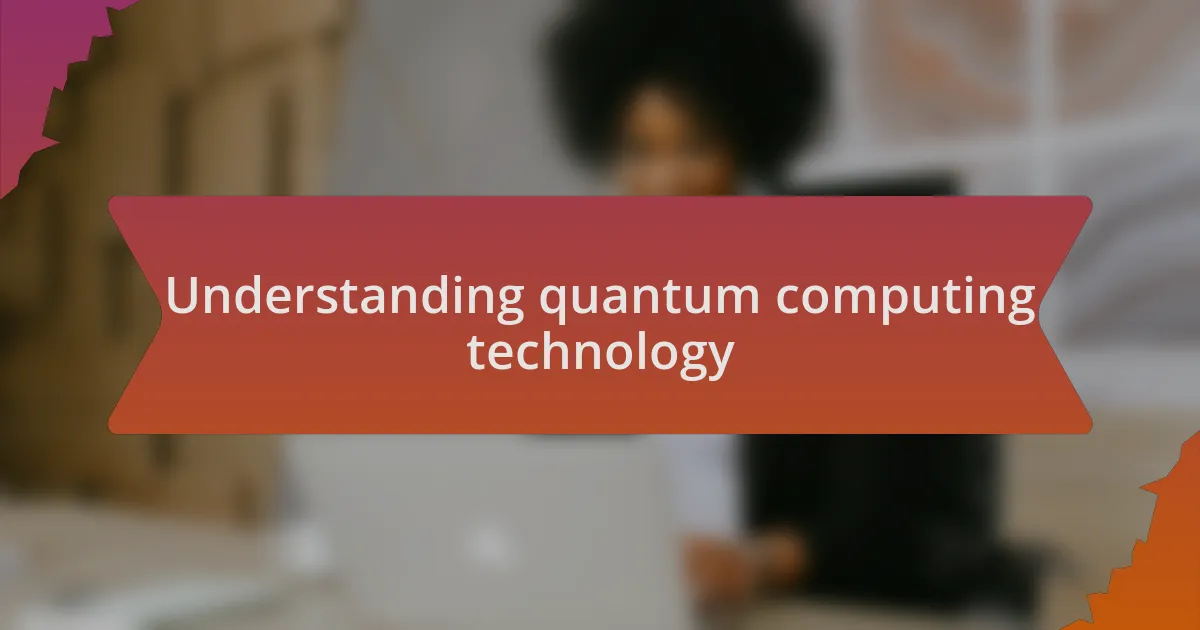
Understanding quantum computing technology
Diving into quantum computing can feel like stepping into another dimension of technology. I still remember the first time I encountered the concept of qubits. The idea that these tiny units of information could exist in multiple states simultaneously felt mind-boggling, almost like magic—yet, it’s grounded in the principles of quantum mechanics.
As I explored further, I discovered that quantum entanglement, where particles become interconnected regardless of distance, really changed my perspective on computing possibilities. Have you ever wondered how something so abstract can lead to tangible advancements? For me, understanding this concept opened a floodgate of potential applications, from cryptography to drug discovery, making the technology seem even more essential.
It’s fascinating to think that classical computers, which operate much like a series of light switches, may soon be outperformed by quantum computers that harness the oddities of the quantum world. This realization sometimes leaves me in awe; it’s both thrilling and intimidating to consider how quickly our technological landscape could change, pushing us toward innovations we can hardly fathom today.
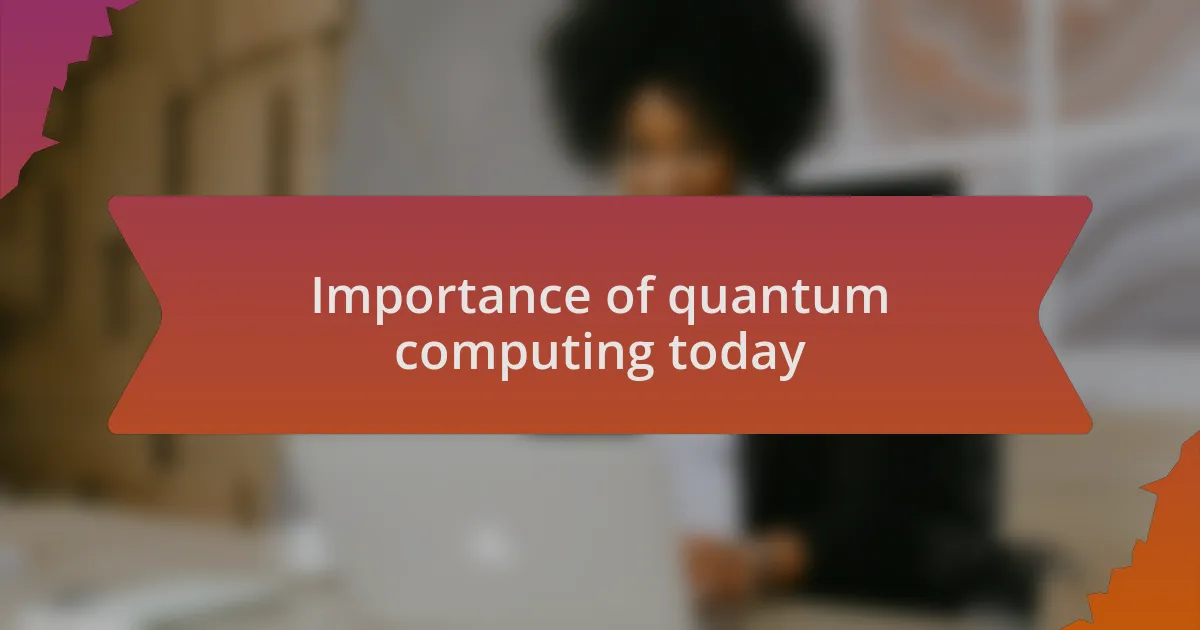
Importance of quantum computing today
The importance of quantum computing today is truly remarkable, and I can’t help but think about how it could redefine problem-solving. Imagine being able to analyze complex data sets—something that takes classical computers ages—in just seconds! Personally, the more I delve into this field, the more I feel that industries like finance, healthcare, and climate science could be fundamentally transformed by this technology.
One thing that struck me was the potential of quantum computing to enhance cybersecurity. As I learned about quantum encryption, I realized it could offer unprecedented security due to the principles of quantum mechanics. Isn’t it exciting to ponder the idea that our sensitive information might soon be safeguarded by the very laws of nature? This is a game changer, especially in an age where data breaches seem to be a daily headline.
Moreover, I can’t resist sharing how quantum computing could accelerate drug development. The notion that we could simulate molecular interactions at an accelerated pace leaves me hopeful. It feels like standing on the brink of a scientific revolution, with better treatments and possibly even cures for diseases on the horizon. These advancements could lead to improved quality of life for millions, which makes me genuinely optimistic about the future of technology.
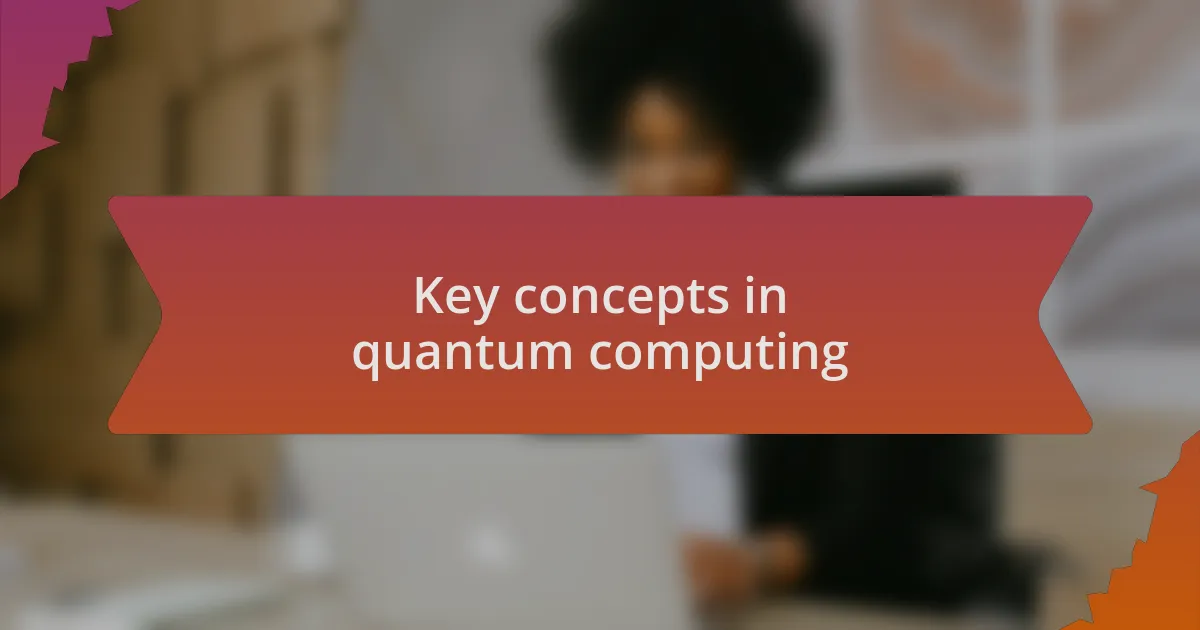
Key concepts in quantum computing
One of the fundamental concepts I found captivating is superposition. In classical computing, a bit is either a 0 or a 1. In contrast, quantum bits, or qubits, can be both at the same time! This notion makes quantum computers capable of processing a vastly larger amount of information simultaneously. It feels almost magical, doesn’t it? When I first grasped this concept, I realized the sheer potential hidden within quantum computing.
Entanglement is another key concept that left me in awe. It’s fascinating how two qubits can become entangled, meaning the state of one instantly affects the state of the other, even if they are separated by large distances. Understanding entanglement led me to appreciate how quantum computing could enable instantaneous communication across vast distances. Have you ever thought about what that could mean for global information sharing? The implications of such connectivity are mind-boggling, and it really stirs my imagination about the future.
Lastly, the principle of quantum interference plays a crucial role in how quantum algorithms work. It’s all about reinforcing the right paths of computation while canceling out the wrong ones. Once I wrapped my head around this idea, I felt a surge of excitement about how this could optimize problem-solving in ways we’ve yet to fully explore. It makes me wonder, what could we achieve if we harnessed these quantum principles to tackle the biggest challenges we face today?

Learning resources for beginners
When I started my journey into quantum computing, I wished I had a curated list of resources to guide me. Online platforms like Coursera and edX offer fantastic beginner courses that break down the complexities into digestible lessons. I remember feeling overwhelmed at first, but these structured courses made each concept feel approachable and exciting, transforming my confusion into curiosity.
Books also played a pivotal role in my understanding. “Quantum Computing for Computer Scientists” became my go-to resource. I appreciated how the author explained technical jargon in layman’s terms, making it easier for someone like me, without a physics background, to grasp the essential ideas. Have you ever picked up a technical book only to feel lost halfway through? That’s why I sought out resources that felt like conversations rather than lectures.
Finally, joining online communities, such as forums on Stack Overflow or subreddits dedicated to quantum computing, enriched my learning experience tremendously. Engaging with others who share the same interests not only clarified my questions but also sparked fascinating discussions that deepened my understanding. It’s amazing how sharing ideas can lead to new insights, don’t you think?
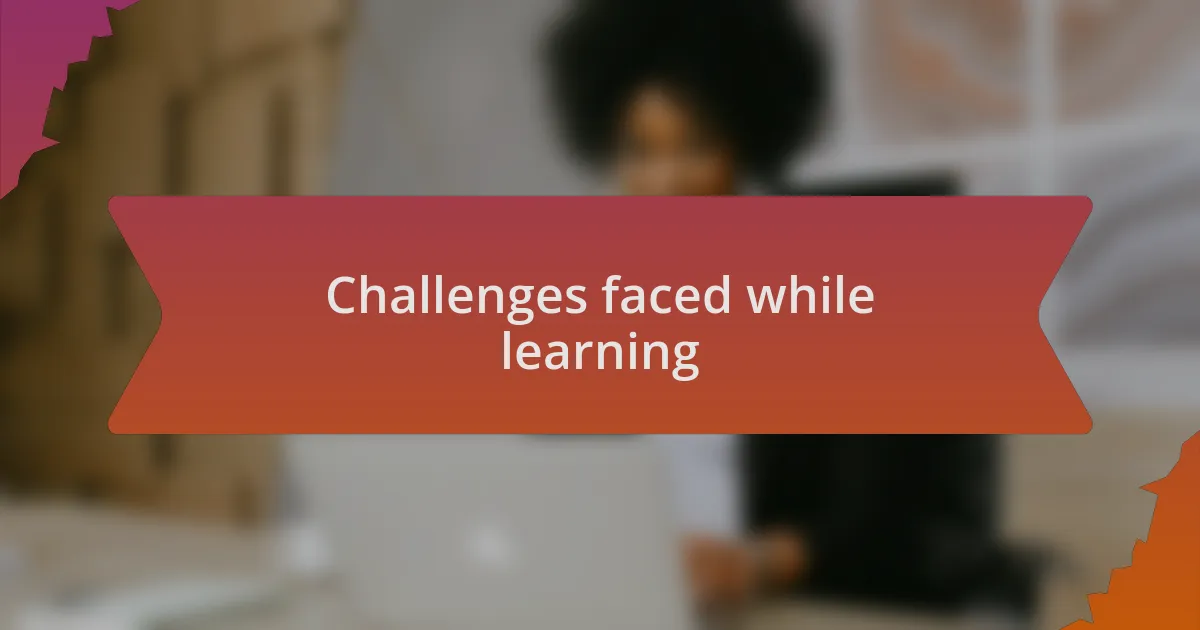
Challenges faced while learning
Diving into quantum computing, I quickly realized the sheer depth of the subject was both a blessing and a curse. It’s fascinating to learn about principles like superposition and entanglement, but sometimes, they felt like mental gymnastics. Have you ever had the sensation of wanting to understand something so deeply, yet feeling like you were grappling with a moving target? I found myself wrestling with these concepts, often requiring multiple explanations before they clicked.
Another significant challenge was the rapidly evolving nature of the field. Just when I thought I had a grasp on a particular technology or algorithm, a new breakthrough would emerge, forcing me to rethink my understanding. I distinctly remember staying up late, trying to absorb information from a recent research paper only to realize I wasn’t even familiar with some of the foundational terms. It made me question whether I was keeping up or merely treading water in an ocean of knowledge.
And then there was the language barrier of quantum computing. Terms like qubit and decoherence initially made me feel like I was entering a foreign country without a phrasebook. I still recall one late night, staring at a particularly dense article filled with jargon, feeling a mix of frustration and determination. Was I crazy to pursue something so intricate? But ultimately, each hurdle was a stepping stone, turning confusion into clarity as I slowly became more comfortable with this thrilling landscape of technology.
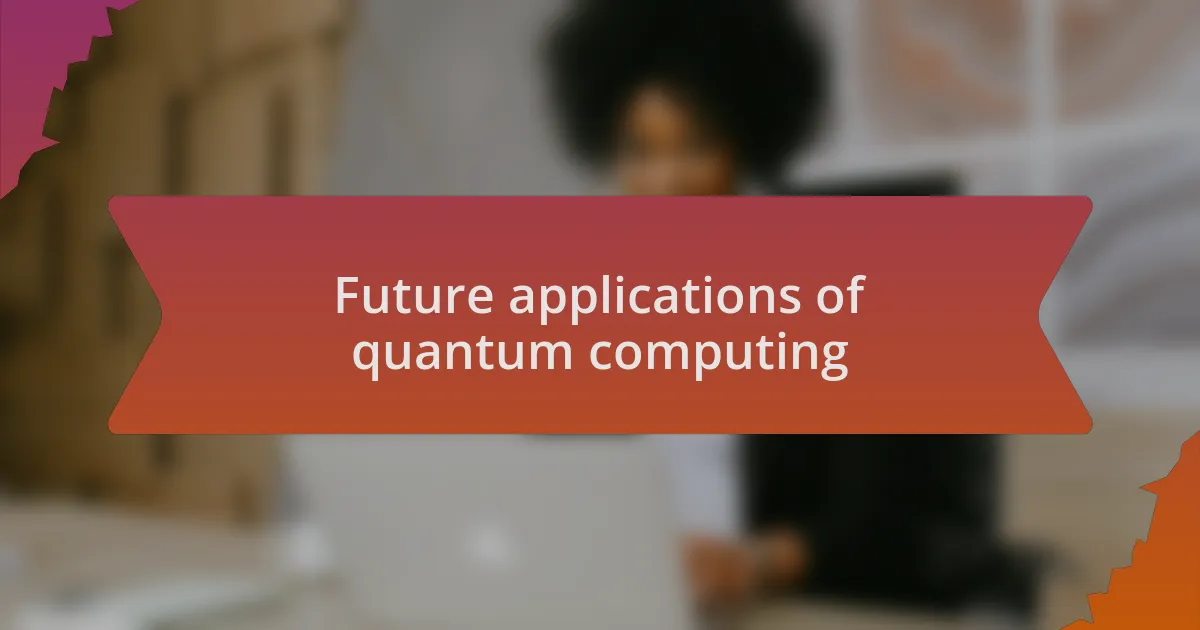
Future applications of quantum computing
The future applications of quantum computing are incredibly exciting, especially in areas like drug discovery and material science. I remember reading about how quantum computers could simulate molecular interactions at an unprecedented level of detail. Picture this: a world where researchers can discover new drugs in mere days instead of months or years. Isn’t that mind-boggling? The potential to revolutionize healthcare while saving countless lives is something I find profoundly inspiring.
Another fascinating application lies in optimizing complex systems, such as supply chains and traffic flow in cities. For instance, imagine a quantum computer analyzing vast amounts of data from various sources to create the most efficient routes for delivery trucks. It’s exciting to think that such advancements could reduce emissions and improve delivery times. Have you ever felt stuck in traffic and longed for a smoother route? Quantum computing might just hold the key to alleviating such everyday frustrations.
Moreover, we could see quantum computing make strides in secure communication. Quantum cryptography harnesses the principles of quantum mechanics to create unhackable encryption methods. The idea that our sensitive information could be shielded with such advanced security makes me feel a sense of reassurance in our digital age. Don’t you sometimes worry about the safety of your online data? Just knowing that quantum technology could bolster security measures is like a breath of fresh air in an increasingly connected and vulnerable world.